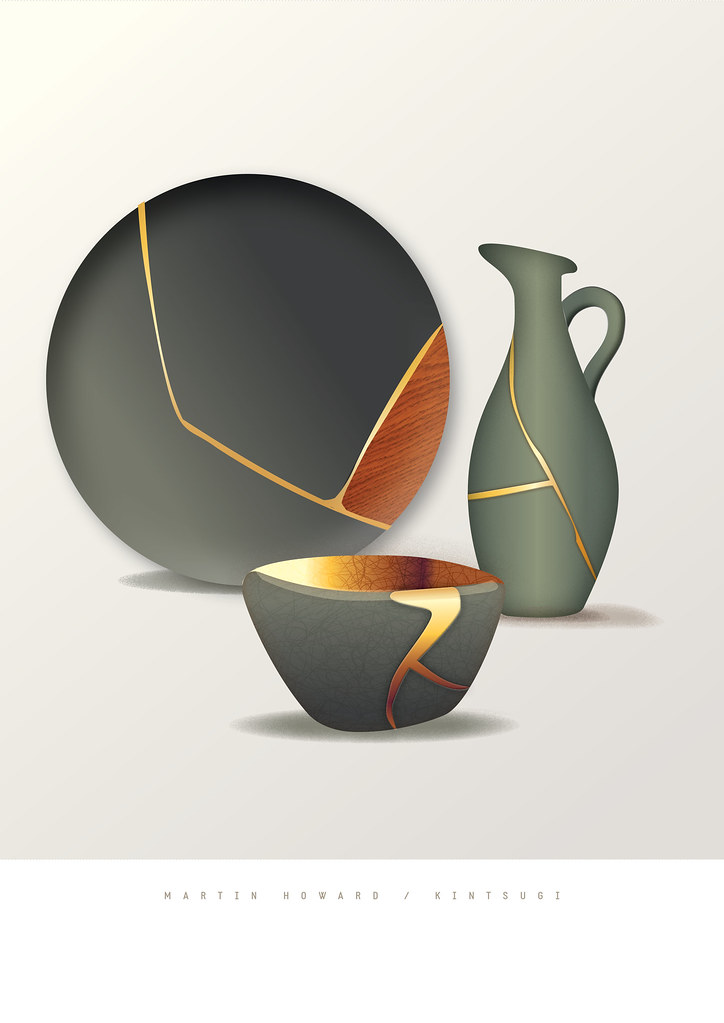|
From the time he was a young man, John Wright Follette's life was dedicated to the Lord. He was an obedient servant of Jesus who used his talents and abilities (singer, musician, teacher, preacher, artist, and poet) to bless many. Broken Bread is a book that records his messages centered on the Lord Jesus where he shares revelation on the meaning of God's Word. One of the chapters titled, "What do you do with your second choice?" grabbed my attention. Follette writes, "Nearly everyone has had to take a second or third choice as far as life's course was concerned. They have had to take the fragments and pieces of their first choice in life, which has been shattered, mend them together and make a success." The concept presented by Follette is that if we allow the Lord to break our self-will, the broken pieces can be used to create something beautiful that serves Jesus and draws us closer to Him.
How many of us can relate to Follette's supposition on the course of our lives? To confirm it, he tells the story of the famous artist, Whistler. Whistler's first choice was to be a soldier, but his studies at West Point were shut down when he flunked chemistry. He moved on to his second choice, engineering, and failed to make the grade for this career. Finally, he pieced his hopes together and started painting. The rest is history. He was meant for his third choice. The apostle Paul had an experience with God where he was shifted from his first choice to another. Seeing the darkness in the town called Bithynia, Paul was convinced that he should preach there. However, this is what Acts 16:7 records: "They tried to enter Bithynia, but the Spirit of Jesus would not allow them to." Follette explains that Paul was "checked abruptly by God. He thinks he has to go to a certain end of the earth, but the Lord says, 'I want you at another end.'" "Paul's first choice is ruined, His ambition, though godly and spiritual, is thwarted." Paul went down to the seaport of Troas where he waited. Here God revealed his plans for him through a vision where a man was begging Paul to "Come over to Macedonia and help us." (Acts 16:9) God's plan was to change the entire direction of Christian missions and move it from the East to the West. Follette asks some questions that would be good for us to ponder: "Can you take a second or a third choice and make it an opportunity in your life? Is your touch with God and the power of the Holy Spirit in your life strong enough to take that broken first choice and out of it make a splendid chance where God can come in and be glorified afresh?" Paul was not discouraged by the abrupt change of plans because he was dedicated to the will of God in his life. The life of Jesus demonstrates the same sequence of events. Follette says, "His first great desire was a ministry among His own people...But 'His own received Him not.' He wanted Israel, but that Bithynia never opened to Him. He found Calvary instead—His Troas. What did He do? He made Calvary, made Troas, to become the doorway to Macedonia and to all the ends of the earth." If we are willing to collect the broken pieces of our first choice, with God's direction, we can use them to make something divine. It seems that brokenness is part of God's process for transformation. Remember the lad who brought his lunch (five loaves and two fish) to a gathering with Jesus. He had to give up all he had to see how Jesus would use the broken pieces of his lunch to feed 5,000. Missionary to Peru, Ruth Stull, says, "If my life is broken when given to Jesus, it is because pieces feed a multitude, while a loaf will satisfy only a little lad." I am reminded of a Japanese art form called Kintsugi. The process includes collecting the broken pieces of pottery and reconstructing them so that they turn into something beautiful. The mending is done by cementing the pieces of the pot together with visible gold seams. This art form is built on the idea that in embracing flaws and imperfections, one can create an even stronger, more magnificent piece of art. Brokenness is part of our lives. However, as we submit the broken parts to Jesus, He will make us better and draw us closer to Himself. 1 Peter 5:10 says it well: "And then, after your brief suffering, the God of all loving grace, who has called you to share in His eternal glory in Christ, will personally and beautifully restore you and make you stronger than ever. Yes, He will set you firmly in place and build you up." (TPT) We must ask ourselves a question: Are we willing to sacrifice our first choices so that God can use the broken pieces of our will and transform us into a vessel of beauty fit for the Master's use? Follette's chapter on second choices concludes this way: "Out of the broken fragments of my first choice I shall mend together a most glorious opportunity in which God may rest and delight Himself." |
Joan E. MathiasCategories
All
Archives
July 2024
|

 RSS Feed
RSS Feed